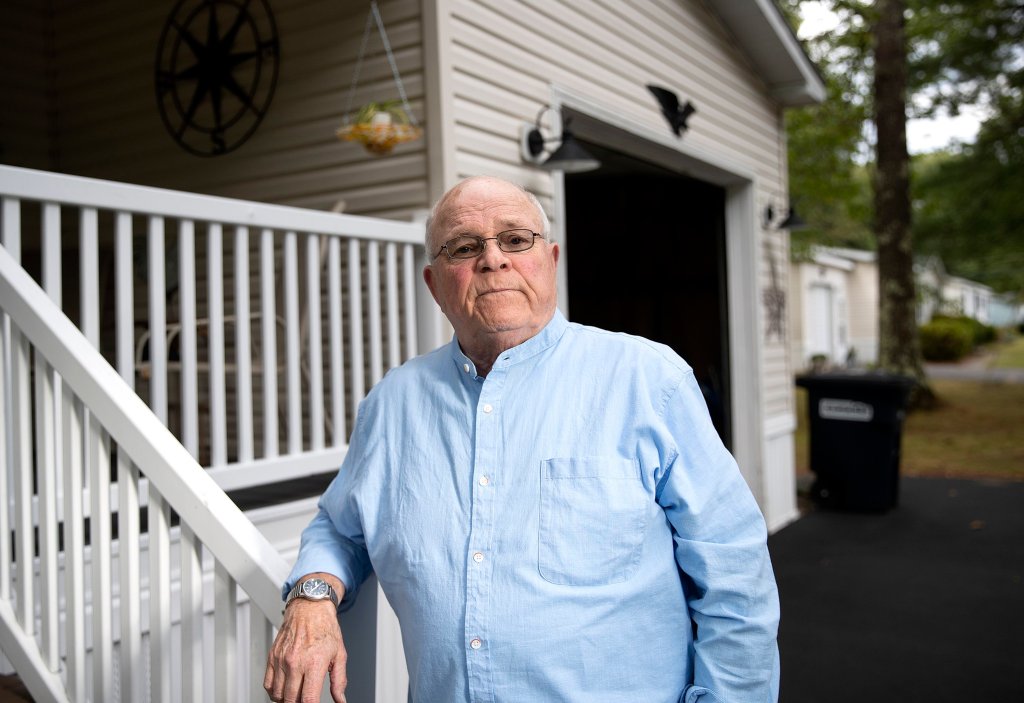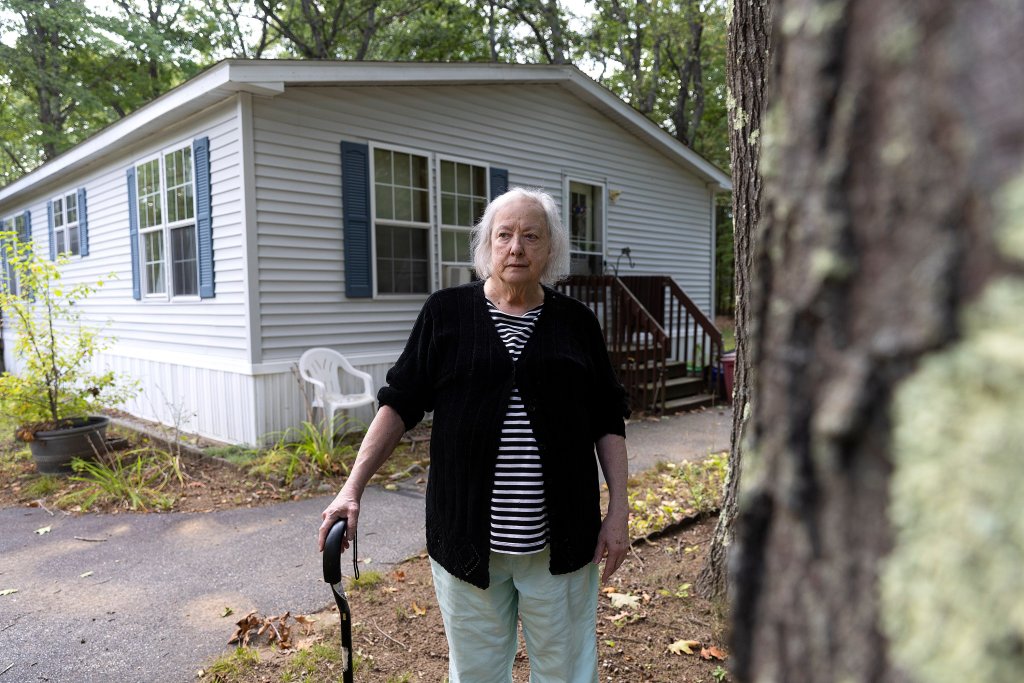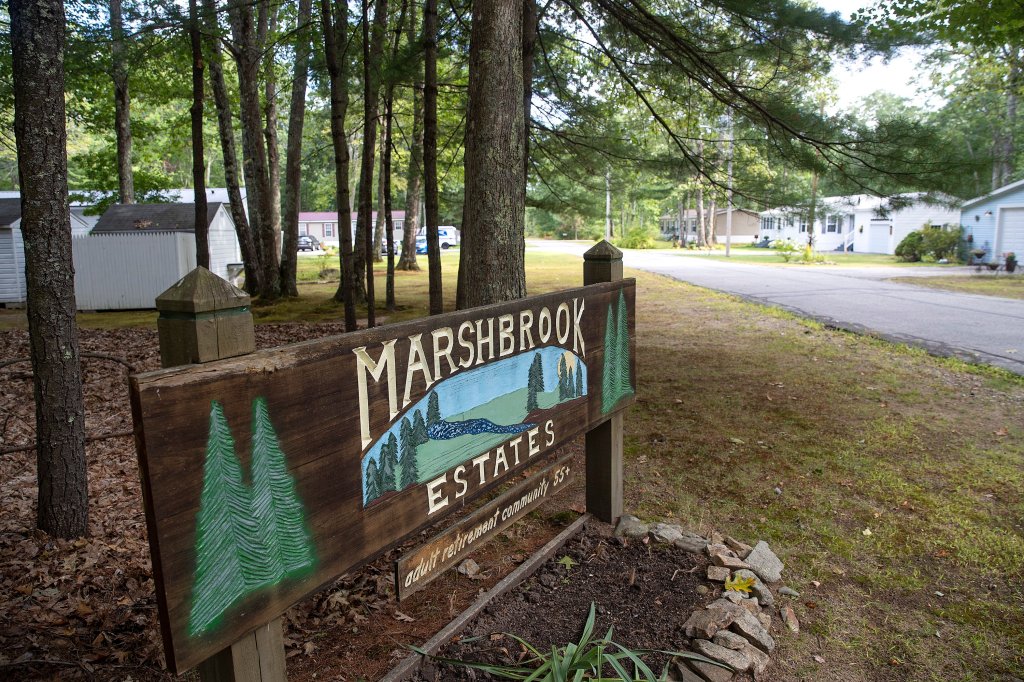
SANFORD — Bruce Gordon moved into Marsh Brook Estates hoping it would be somewhere he could enjoy retirement. And while the 81-year-old did retire briefly in 2022, he’s now a school bus driver.
“I went back to work for a few hours (per week) because of the economy and the park rent, and now I’m back to a lot of hours,” he said.
Rent for his lot at the manufactured housing park recently increased by $75. He’s now paying $600 per month, nearly double the rate he paid when he moved in five years ago.
The increases have residents in the park — which is for older adults, including many on fixed incomes — worrying about how they’ll be able to continue to afford living there. One resident is moving out because she can’t manage the higher bills.
City and state officials have taken notice. The Sanford City Council is expected to consider an emergency ordinance on Tuesday that would put in place a 90-day moratorium on mobile home lot rent increases while staff work on developing long-term regulations.
If approved, Sanford would become the latest community in Maine to take steps toward limiting lot rent increases at manufactured housing and mobile home parks.
Old Orchard Beach residents voted in November to approve a rent stabilization ordinance for mobile home parks, capping annual increases at 5%, except under special circumstances.
The Waterville City Council voted this month to approve a temporary moratorium on lot rent increases while the city develops a rent stabilization ordinance. And officials in Brunswick recently approved funding to study a possible ordinance in that community after hearing from mobile home park residents that rents there are making a previously affordable housing option unsustainable.
In Gorham, residents of the Friendly Village mobile home park are hoping their town council will approve ordinance changes that are under consideration for restricting excessive rent increases.
KEY SOURCE OF AFFORDABLE HOUSING
About 45,000 people in Maine live in mobile home parks, said Laura Mitchell, executive director of the Maine Affordable Housing Coalition, a group that advocates for the creation and preservation of affordable housing.
Many parks have seen recent rent increases after a sale, particularly as property values and demand for housing have gone up and attracted larger companies and out-of-state firms.
“I think towns are trying to be proactive in thinking about, how do we not have (these large rent increases) happen to sometimes hundreds or thousands of people who are in this circumstance of being really vulnerable,” Mitchell said. “Towns are trying to do what they can to help those residents.”
Philips International, the New York-based company that owns Marsh Brook Estates and three other manufactured housing parks in Sanford, did not respond to a voicemail message or email seeking comment on the rent increases and steps being taken by the city.
At a council meeting earlier this month, Sanford City Manager Steven Buck told councilors he had reviewed the steps taken in Old Orchard Beach and Waterville and was planning to craft an emergency moratorium that temporarily “puts the brakes on any increase at all.”
The council then voted 7-0 to have Buck draft the emergency moratorium.
Mayor Becky Brink said at the meeting that it will give the city time to craft longer-term regulations. She pointed out that owners of manufactured and mobile homes are in a unique situation because while they own their homes, they rent the land they are on.
“These are people who have paid a mortgage and own their home on a piece of land they’re renting,” Brink said. “So now, what it looks like to me … is like the people are being held hostage.”
INCREASES UNSUSTAINABLE FOR SOME
At Marsh Brook Estates, residents said they hope to see some relief in whatever the city ends up passing. Ellen Papale, 70, took over her home from her parents, who first moved in in the 1990s, but is preparing to move because she can no longer afford the lot rent. Like Gordon, hers increased to $600.
“Between (rent) and utilities and home insurance, it’s taking almost three-quarters of my income,” said Papale, who relies on Social Security but said it hasn’t kept up with cost-of-living.

Papale said she can’t afford a car, but she’s hoping that by moving to an apartment and applying for rental assistance, it might improve her situation. She said the city ordinance is coming too late to help her, but she’s hoping it will help others stay in their homes.
“I’m willing to do whatever I can to help them get this through,” she said.
Other residents worry about the value of their homes depreciating because of the high rents.
“You can’t sell your home,” said Darrell Marin, who has lived in the park for 15 years. While he and his husband also recently saw their lot rent increase to $600 per month, some newer residents in the park are now paying up to $900 per month, he said.
“Nobody wants to pay two mortgages (for the lot rent and the mortgage),” said Marin, 73. “So our property is devaluing. As we’re putting more into it and making it a nicer home, we’re losing it.”
Gordon also worries about the ability of new people to move into a park with rising rents.
“Unless these people are able to come in and buy their place outright, to come in and have a mortgage and pay $900 per month (in lot rent), it kind of knocks them off the mortgage list,” he said.
RENT STABILIZATION A POSSIBILITY
Talk of rent stabilization ordinances in Sanford and other Maine communities comes as state lawmakers also are taking steps to preserve the affordability of mobile home and manufactured housing communities.
Last spring, the Legislature passed bills giving mobile home residents “the right of first refusal” when their parks go up for sale and establishing a permanent fund to assist mobile home owners in purchasing their parks, thus giving them more say over future rent increases and operations.
Another new law, though originally proposed with statewide caps on rent increases, instead has directed the state to come up with a sample rent stabilization ordinance for municipalities to use and has resulted in a working group to look at long-term affordability of mobile home parks.
In general, rent control policies and limits on rent increases can help manage skyrocketing rents that wage increases aren’t keeping up with, though there can be unintended consequences that come from such policies, said Mitchell, from the Maine Affordable Housing Coalition.
“What we have seen in other parts of the country is that it can be ineffective over the long term in spurring the development of other housing and other sources of affordable housing,” Mitchell said. “It can also put at risk some serious investments mobile home owners need to make to maintain their parks.”
She said the issue is complicated, and towns should be thoughtful about what policies they choose to adopt.
“There is something to be said for local communities taking a look at this and figuring out what works best for their situation,” Mitchell said. “They have the relationship with the park owners to see what’s going on and what the needs are.”

Leigh Wood, a resident of Marsh Brook Estates, hopes to see Sanford step in and pass a rent stabilization ordinance. She understands that, at the state level, some lawmakers may have been reticent to pass broader rent control laws out of fear of hurting “mom and pop” park owners who are legitimately facing increased costs.
But Wood said that’s not the case at Marsh Brook, where Philips International has raised rents significantly without any increase in services.
“This is supposed to be seniors coming to their last residence …” she said. “This is supposed to be the golden years.”

We invite you to add your comments. We encourage a thoughtful exchange of ideas and information on this website. By joining the conversation, you are agreeing to our commenting policy and terms of use. More information is found on our FAQs. You can modify your screen name here.
Comments are managed by our staff during regular business hours Monday through Friday as well as limited hours on Saturday and Sunday. Comments held for moderation outside of those hours may take longer to approve.
Join the Conversation
Please sign into your CentralMaine.com account to participate in conversations below. If you do not have an account, you can register or subscribe. Questions? Please see our FAQs.